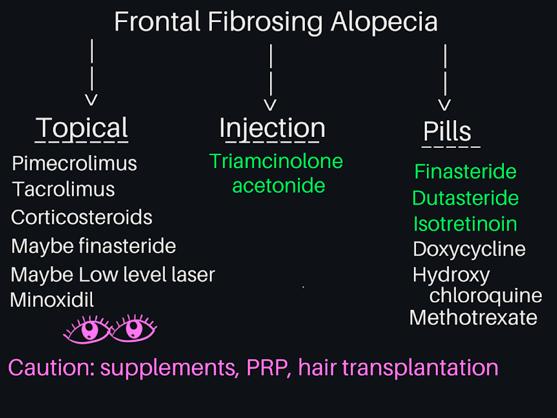Frontal Fibrosing Alopecia: What are the treatments?
What are the treatments for frontal fibrosing alopecia?
Frontal fibrosing alopecia (FFA) is scarring alopecia that mainly affects women. Hair loss often begins in the eyebrows or in the frontal hairline - or both. The precise cause is unknown although hormone-related and immune-related mechanisms are felt to be involved. A variety of treatments are available to stop the disease although treatments are not effective in everyone. Sometimes regrowth to a slight degree of even marked degree can occur. However, the main goal of treatment of all scarring alopecias is to stop them from getting worse.
SEE PREVIOUS ARTICLES ON FFA
Do I have Frontal Fibrosing Alopecia?
Inflammation in Frontal Fibrosing Alopecia
Baby Hairs in Frontal Fibrosing Alopecia
Frontal Fibrosing Alopecia: How long until treatments start helping?
FFA vs LPP: Which is often quieter in its appearance?
Scaling around Hairs in Frontal Fibrosing Alopecia
What treatments have good evidence of helping?
The treatments with the best evidence for helping FFA are the antiandrogens (finasteride/dutasteride) and the retinoids (isotretinoin). Other oral agents like doxycycline, hydroxychloroquine (Plaquenil) and methotrexate also are helpful although likely not quite to the same degree as the retinoids and antiandrogens.
Topical calcineurin inhibitors (tacrolimus, pimecrolimus) do appear more helpful than topical steroids based on a limited number of published studies. Topical antiandrogens likely help somewhat as well but require more study. Low level laser also needs more study but may have a role too. Steroid injections with triamcinolone acetonide help some patients (not all) and are typically performed every 2-3 months.
What treatments must we be very careful of?
Treatments like platelet rich plasma (PRP) are popular but have absolutely no solid evidence of being helpful in FFA. Hair transplants are an option if the disease has been completely quiet for 2 years (without medication) and the patient has proven that no hair loss has occurred in that 2 year waiting period. Otherwise hair transplants are not a good idea and can be a disaster leading to more hair loss.
Donovan Criteria for Hair Transplantation in FFA
Most hair supplements have limited benefit for FFA and can not be routinely recommended at this time.
The exact treatment I recommend depends on many patient factors. In general, I often start with a combination of topical steroids+ topical calcineurin inhibitors (pimecrolimus) + steroid injections + one systemic agent (pills). There is no standard template as it depends on patient factors. For example, a patient with a history of severe depression or personal history of breast cancer might not be started on finasteride.
This article was written by Dr. Jeff Donovan, a Canadian and US board certified dermatologist specializing exclusively in hair loss.

